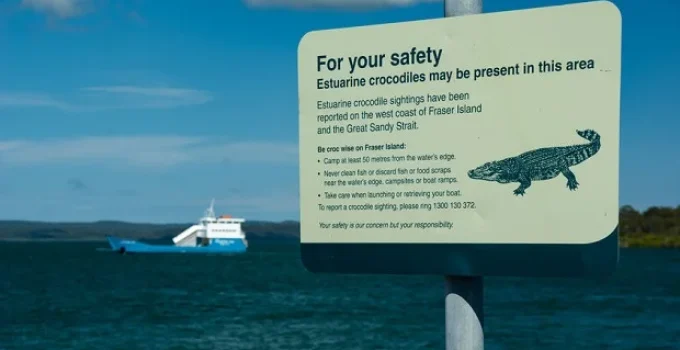Can Crocodiles Live in Salt Water?
Yes, some crocodiles can live in salt water—especially the aptly named saltwater crocodile. Crocodiles are highly adaptable reptiles, but not all species can tolerate high salinity. Among the 23 known crocodilian species, only a few are physiologically and behaviorally equipped to thrive in marine or brackish environments. This article explores which crocodiles inhabit salt water, how they survive it, and why this ability varies between species.
Dive Deeper
- Which Crocodiles Live in Salt Water?
- How Do Crocodiles Survive in Salty Environments?
- Saltwater vs. Freshwater Crocodiles
- Where Are Saltwater Crocodiles Found?
- Why Don’t All Crocodiles Live in Salt Water?
- 🎯 Final Thoughts
- 📚 References
🌊 Which Crocodiles Live in Salt Water?
The primary saltwater-adapted crocodile species is the saltwater crocodile (Crocodylus porosus), also known as the “salty” or “estuarine crocodile.” This species is not only tolerant of salt water—it prefers coastal areas, river mouths, and mangroves.
Other species occasionally found in brackish or saline environments include:
- American crocodile (Crocodylus acutus) – Common in coastal wetlands and mangrove lagoons
- New Guinea crocodile (Crocodylus novaeguineae) – Tolerates brackish waters but prefers freshwater
| Species | Saltwater Tolerance | Primary Habitat |
|---|---|---|
| C. porosus (Saltwater) | High ✅ | Coasts, estuaries, rivers |
| C. acutus (American) | Moderate ⚠️ | Lagoons, coastal marshes |
| C. niloticus (Nile) | Low ❌ | Freshwater lakes, rivers |
| C. johnstoni (Freshwater) | Very low ❌ | Inland rivers, billabongs |
📊 Fun Fact: The saltwater crocodile is the largest living reptile, reaching lengths of over 20 feet (6 meters) and weighing more than 2,000 pounds (900 kg) [1].
🧪 How Do Crocodiles Survive in Salty Environments?
To survive in salt water, crocodiles need mechanisms to regulate salt levels in their bodies:
- Lingual salt glands: Located on the tongue, these excrete excess salt from the bloodstream
- Impermeable skin: Their thick, scaly hides prevent salt from entering through osmosis
- Behavioral regulation: Saltwater crocs often alternate between saline and freshwater environments to balance salt intake
Freshwater crocodiles also have salt glands, but they are less effective, limiting their ability to tolerate marine conditions.
🐊 Saltwater vs. Freshwater Crocodiles
Despite belonging to the same family, saltwater and freshwater crocodiles differ significantly:
| Feature | Saltwater Crocodile | Freshwater Crocodile |
|---|---|---|
| Max length | ~20 ft (6 m) | ~10 ft (3 m) |
| Aggression | Highly territorial & aggressive | Shy and less confrontational |
| Salt tolerance | High (true marine capability) | Very low |
| Geographic range | SE Asia to northern Australia | Northern Australia (inland only) |
📊 According to the IUCN, C. porosus has one of the broadest geographic distributions of any modern reptile [2].
🌍 Where Are Saltwater Crocodiles Found?
Saltwater crocodiles inhabit a wide range of coastal habitats:
- Northern Australia – Northern Territory, Queensland, and Western Australia
- Southeast Asia – Indonesia, Malaysia, Papua New Guinea
- South Asia – India, Sri Lanka
- Pacific Islands – Solomon Islands, Vanuatu
They can travel over 900 km (560 miles) by sea using ocean currents, allowing them to colonize remote islands and new estuaries [3].
❓ Why Don’t All Crocodiles Live in Salt Water?
Not all crocodiles evolved to tolerate salinity. Factors influencing this include:
- Evolutionary adaptation: Only some species developed efficient salt glands
- Habitat specialization: Many crocodiles are riverine specialists
- Competition and predation: Ecological pressures may have limited saltwater expansion in some species
Saltwater tolerance is a complex trait shaped by millions of years of environmental interaction and natural selection.
🎯 Final Thoughts
So, can crocodiles live in salt water? Some absolutely can—especially the saltwater crocodile, one of nature’s most formidable survivors. Equipped with salt-excreting glands, tough skin, and marine mobility, these reptiles dominate coastlines across the Indo-Pacific. But most crocodile species remain freshwater-bound, each adapted to its own ecological niche. Their diversity reflects an ancient lineage shaped by geography, physiology, and time.
📚 References
- Campbell, H. A., et al. (2010). Using acceleration and GPS data to estimate movement and activity of large saltwater crocodiles. Ecology, Link
- Webb, G. J. W., & Manolis, S. C. (1989). Crocodiles of Australia. Reed Books.
- IUCN Red List. Crocodylus porosus Species Profile. Link
